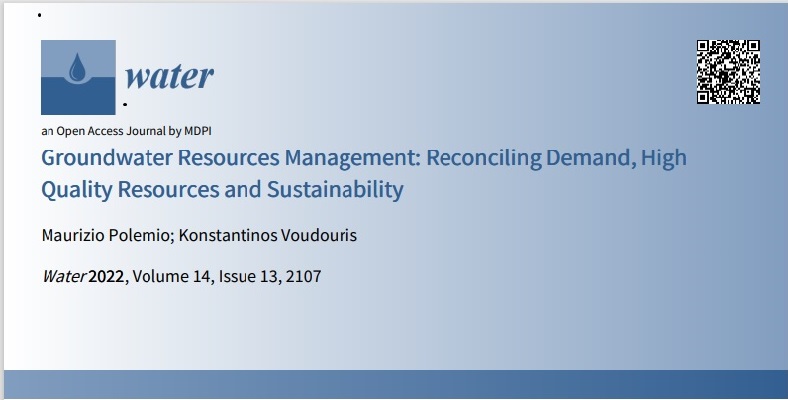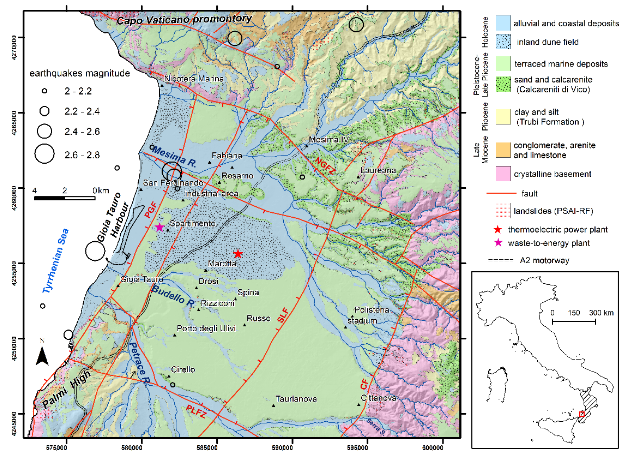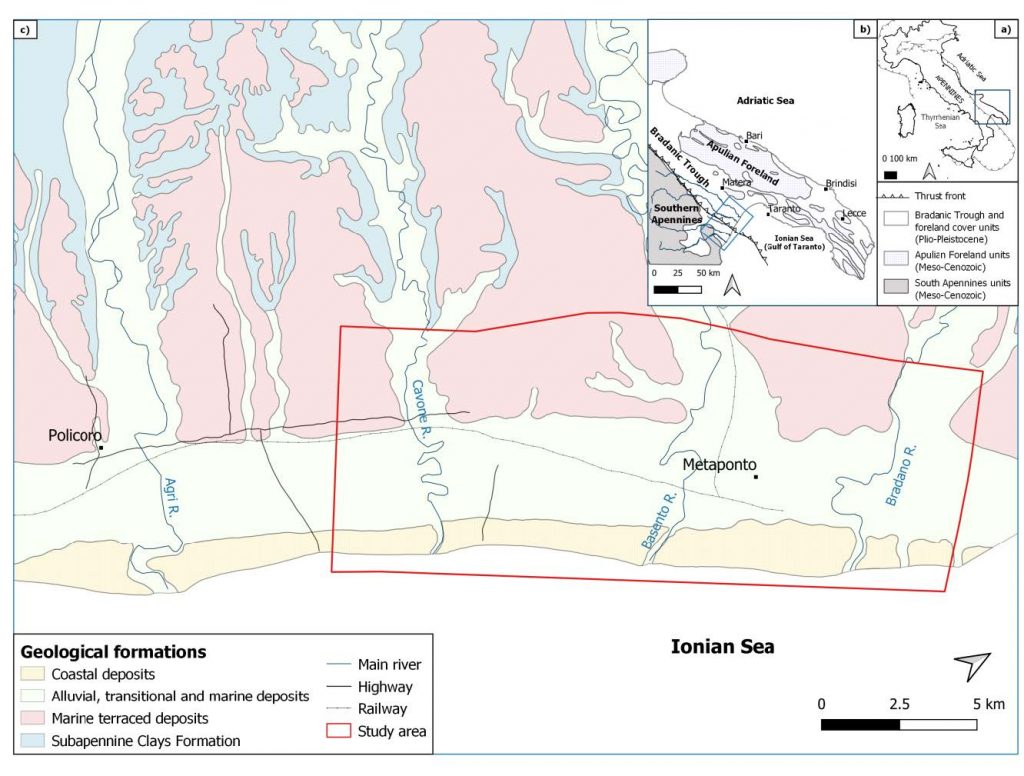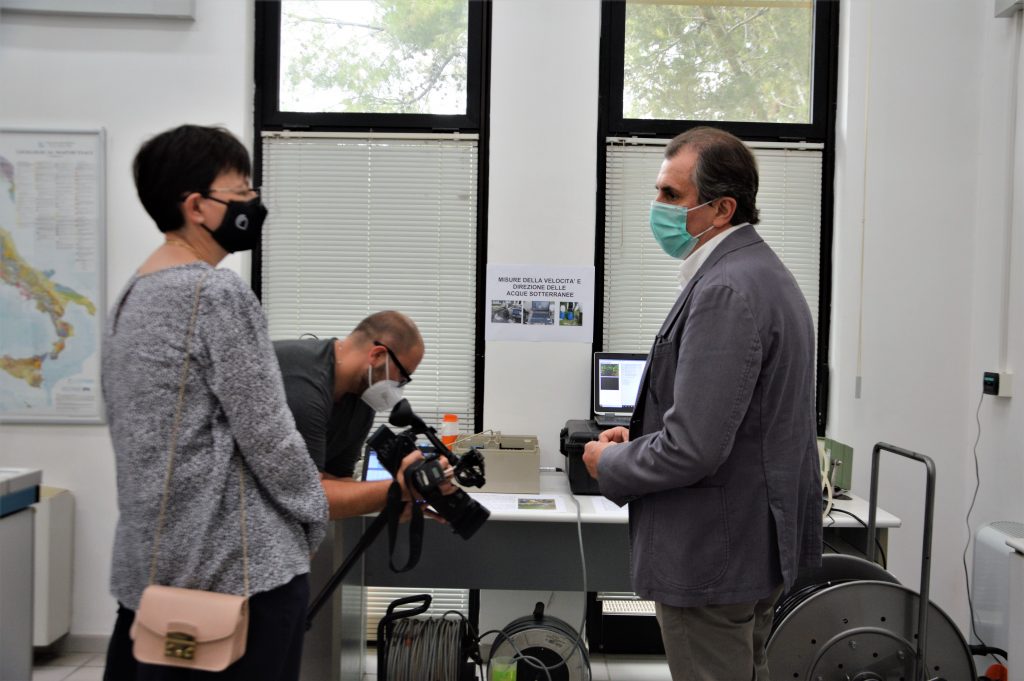Categoria: Documenti (Pubblicazioni, Report)
CALL FOR APPLICATION FOR RESEARCH SCHOLARSHIPS ON NATURAL HAZARDS – SUPPORT MEASURES FOR THE UKRAINIAN SCIENTIFIC COMMUNITY
The Research Institute for Hydrogeological Prevention and Protection (IRPI), an Institute of the Italian National Research Council (CNR) is pleased to announce the call for applications for 3 scholarships for graduates to conduct research activities in the scientific area of natural hazards.
Scholarships will be fruited at the IRPI Sections located in PERUGIA, BARI and TORINO. PERUGIA: Evaluation of hazard and risk posed by geo-hydrological disaster.
TORINO: Studies dedicated to mapping, modelling and monitoring of mass movements especially muddy-debris flow.
BARI: Groundwater resources matters (assessment, monitoring, risks, and management), including geothermal application.
The scholarship grant consists of a monthly gross amount of 1.084,56 euros, annually renewable up to a maximum of three years.
In order to participate in the selection, the applicants must:
• be of Ukrainian nationality
• have a proficiency in English language
• have a university study qualification in disciplines belonging to the Natural Hazards scientific area.
A public selection will be carried out, based on qualifications and supplemented with an on-line digital interview.
Application: https://www.urp.cnr.it/copertine/formazione/form_borse/BorseUcraina/borse_ukraina_attive.htm
Contactcs: maurizio.polemio@irpi.cnr.it
Deadline for application: 3 October 2022
Groundwater Resources Management: Reconciling Demand, High Quality Resources and Sustainability
Questo numero speciale a firma di Maurizio Polemio e Konstantinos Voudourisc omprende diversi articoli relativi alla gestione delle acque sotterranee, modellazione integrata, valutazione degli impatti dei cambiamenti climatici sulle risorse idriche sotterranee in termini di quantità e qualità, sulla ricarica artificiale, metodi di valutazione dei rischi e delle vulnerabilità, delineazione geofisica della interfaccia acqua dolce-salina e analisi statistica dei dati di monitoraggio. I 13 articoli di questo numero speciale sono stati forniti da 69 scienziati di 14 paesi relativi a 4 continenti, offrendo cosi una panoramica molto ampia dell’argomento.
Il documento pubblicato in open access è disponibile al seguente link:
Different Ground Subsidence Contributions Revealed by Integrated Discussion of Sentinel-1 Datasets, Well Discharge, Stratigraphical and Geomorphological Data: The Case of the Gioia Tauro Coastal Plain (Southern Italy)
Le acque sotterranee sono il principale approvvigionamento idrico per le esigenze agricole e industriali in molte pianure costiere in tutto il mondo. Il loro esaurimento spesso innesca la subsidenza del suolo, che minaccia le infrastrutture e le attività artificiali e aggrava altri rischi geologici. Questo recente articolo appena pubblicato decrive l’applicazione di una tecnica radar ad apertura sintetica interferometrica multitemporale ai set di dati Sentinel-1 per rilevare il movimento del suolo nella piana di Gioia Tauro (Calabria, Sud Italia) dal 2018 al 2021.
L’articolo pubblicato sulla rivista Sustainability è disponibile in open access al seguente link:
Sustainability 2022, 14(5), 2926; https://doi.org/10.3390/su14052926
Hydrostratigraphic Framework and Physicochemical Status of Groundwater in the Gioia Tauro Coastal Plain (Calabria—Southern Italy)
Sulla rivista Water (Water 2021, 13, 327) è stato pubblicato un nuovo articolo scientifico che tratta dello studio delle acque sotterranee della piana di Gioia Tauro (costa tirrenica, Calabria, Italia meridionale) in termini di idrostatigrafia e stato chimico fisico.
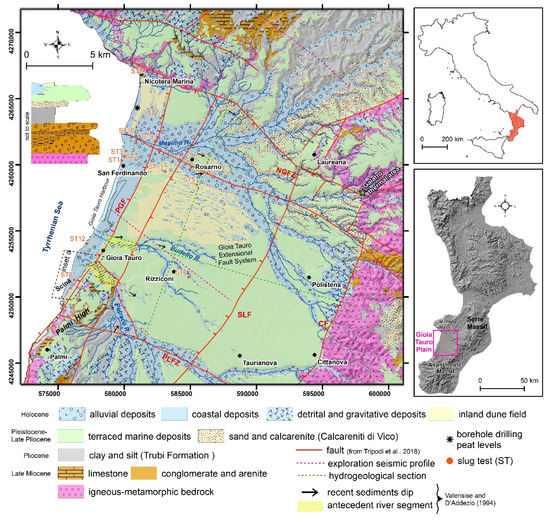
L’articolo completo e disponibile e scaricabile al seguente link:
Workshop dell’Istituto di ricerca per la protezione idrogeologica, Cnr-Irpi, “Il contributo del Cnr-Irpi al sistema paese per la mitigazione dei rischi geo-idrologici”,
Il 26 novembre scorso, si è concluso il workshop dell’Istituto di ricerca per la protezione idrogeologica, Cnr-Irpi, dal titolo “Il contributo del Cnr-Irpi al sistema paese per la mitigazione dei rischi geo-idrologici”, organizzato presso la Sala convegni della sede del Cnr in piazzale Aldo Moro a Roma in occasione dei 50 anni di attività dell’Istituto.
Il workshop, inaugurato il 25 novembre, si è articolato in 4 sessioni tematiche che, tra interventi in presenza e in remoto, si sono susseguite nelle due giornate. La prima è stata dedicata alle tecnologie e ai sistemi per il monitoraggio e la previsione dei fenomeni geo-idrologici, la seconda alle ricerche svolte per la caratterizzazione e l’analisi dei processi che sono alla base della formazione dei fenomeni geo-idrologici. La terza e corposa sessione ha indirizzato gli avanzamenti fatti nei settori che abbracciano la valutazione della pericolosità geo-idrologica, la stima dei possibili impatti e la definizione delle misure di mitigazione dei rischi in un contesto di cambiamento globale. La quarta sessione è stata dedicata al tema della comunicazione dei rischi geo-idrologici e delle relative incertezze, comunicazione che si rivolge non solo agli addetti ai lavori, ma anche a un più ampio pubblico con la finalità di sensibilizzare i cittadini alle problematiche del dissesto geo-idrologico.
Le sessioni hanno rappresentato le molteplici attività svolte dall’Istituto, la cui missione è quella di promuovere l’avanzamento della conoscenza sui processi che sono alla base della formazione dei rischi geo-idrologici al fine di individuare misure adeguate per la protezione territoriale e ambientale, e nonché per lo sfruttamento sostenibile delle geo-risorse. Sono stati presentati i risultati finora ottenuti dall’Istituto nel campo del monitoraggio e della previsione dei fenomeni geo-idrologici, nella determinazione del loro impatto al suolo e della mitigazione e nonché dell’effetto del cambiamento climatico su tali fenomeni.
I lavori sono stati aperti ieri mattina dal direttore dell’Istituto, Tommaso Moramarco, che ha poi lasciato la parola ai suoi predecessori, Lucio Ubertini, Fausto Guzzetti e Alessandro Pasuto. Gli interventi successivi del presidente della Commissione grandi rischi, Gabriele Scarascia Mugnozza, e del direttore del Dipartimento scienze del sistema terra e tecnologie per l’ambiente del Cnr, Fabio Trincardi, hanno evidenziato il ruolo chiave dell’istituto nella ricerca sui rischi geo-idrologici, a livello nazionale ed internazionale.
“Nei suoi 50 anni di attività l’Irpi ha contribuito alla sicurezza geo-idrologica del nostro Paese favorendo adeguate misure di mitigazione del rischio, mediante l’avanzamento della conoscenza sui processi che sono alla base dei fenomeni naturali potenzialmente pericolosi”, queste le parole con le quali il direttore ha aperto il discorso di inaugurazione. Il discorso ha poi toccato i vari momenti della vita dell’istituto e il suo ruolo nella ricerca internazionale, ricordando anche gli sforzi messi in campo a supporto delle amministrazioni impegnate sia nella pianificazione che nella gestione territoriale. Infine l’ingegnere Moramarco ha sottolineato il ruolo centrale dell’istituto quale Centro di competenza del Dipartimento nazionale della protezione civile sui rischi geo-idrologici, ed in particolare sul rischio da frana e da inondazione.
Hydrogeology and seawater intrusion proneness in the Metaponto plain aquifer (Basilicata, Italy)
E’ disponibile online sul sito della rivista scientifica Italian Journal of Engineering Geology and Environment un nuovo articolo a cura del Gruppo di Idrogeologia. L’articolo tratta il fenomeno dell’intrusione marina quale problema idrogeologico più tipico per gli acquiferi costieri e del conseguente rischio di degrado qualitativo delle acque sotterranee. Evidenzia inoltre, l’importanza dell’elaborazione e dell’applicazione di metodi efficienti per la
prevenzione e la mitigazione dei processi di salinizzazione, che possono rendere le acque sotterranee inutilizzabili sia a scopo potabile che irriguo.
L’articolo è disponibile e scariabile in open access:
Muzzillo, R., Zuffianò, L. E., Canora, F., De Giorgio, G., Limoni, P. P., Polemio, M., & Sdao, F. (2021). Hydrogeology and seawater intrusion proneness in the Metaponto plain aquifer (Basilicata, Italy). Italian Journal of Engineering Geology and Environment, 1(2021–1), 139–149. doi: 10.4408/IJEGE.2021-01.S-13
La Presidente del CNR visita l’Area di Ricerca di Bari
«L’Area, la più numerosa del Mezzogiorno, con la sua articolazione esprime la multidisciplinarietà dell’Ente, che assieme alla distribuzione capillare sul territorio è una nostra preziosa caratteristica», ha dichiarato.
Lo scorso venerdì 25 giugno, la Presidente del CNR Prof. Maria Chiara Carrozza ha visitato l’Area di Ricerca di Bari e gran parte dei laboratori di ricerca dei numerosi Istituti che ne fanno parte accompagnata dai rispettivi Direttori o da propri delegati i quali hanno illustrato le attività svolte e le infrastrutture presenti. Durante il suo percorso di visita si è soffermata in particolare nel labotatorio di Idrologia Superficiale e Sotterranea dove il responsabile scientifico Ing. Maurizio Polemio le ha mostrato le particolari e sofosticate apparecchiature di cui è dotato e le principali attività di ricerca che vengono condotte nell’ambito dell’idrogeologia superficiale e sotterranea.
Al momento della visita nel laboratorio ha rilasciato un’intervista al TGR Puglia:
Puglia, eccellenza per ricerca e transizione ecologica | CNR WebTV
Accordo quadro di collaborazione tra Università della Corsica Pasquale Paoli e l’IRPI
Nell’ambito degli interessi istituzionali dei firmatari, è stato stipulato un accordo tra L’Università della Corsica “Pasquale Paoli” e l’IRPI focalizzato sulle seguenti tematiche: idrogeologia, idrologia isotopica, geochimica e gestione delle acque, e in particolare lo sviluppo e l’applicazione di modelli, metodi e strumenti per la gestione sostenibile ottimale. Obiettivo principale di tale accordo è la collaborazione scientifica e tecnica definendo un meccanismo in varie attività delle geoscienze, consentendo un flusso di scambio bidirezionale di dati, informazioni e conoscenze per promuovere la ricerca collaborativa nel campo delle tematiche suddette.
Sito web istituzione
https://www.universita.corsica/en/
Data inizio
18/03/2021
Data fine
17/03/2025
Referente istituzione straniera
Mr. Frederic HUNEAU
Referente IRPI
Ing. Maurizio Polemio
Seawater Intrusion Proneness and Geophysical Investigations in the Metaponto Coastal Plain (Basilicata, Italy)
Muzzillo, R.; Zuffianò, L.E.; Rizzo, E.; Canora, F.; Capozzoli, L.; Giampaolo, V.; De Giorgio, G.; Sdao, F.; Polemio, M. Seawater Intrusion Proneness and Geophysical Investigations in the Metaponto Coastal Plain (Basilicata, Italy). Water 2021, 13, 53
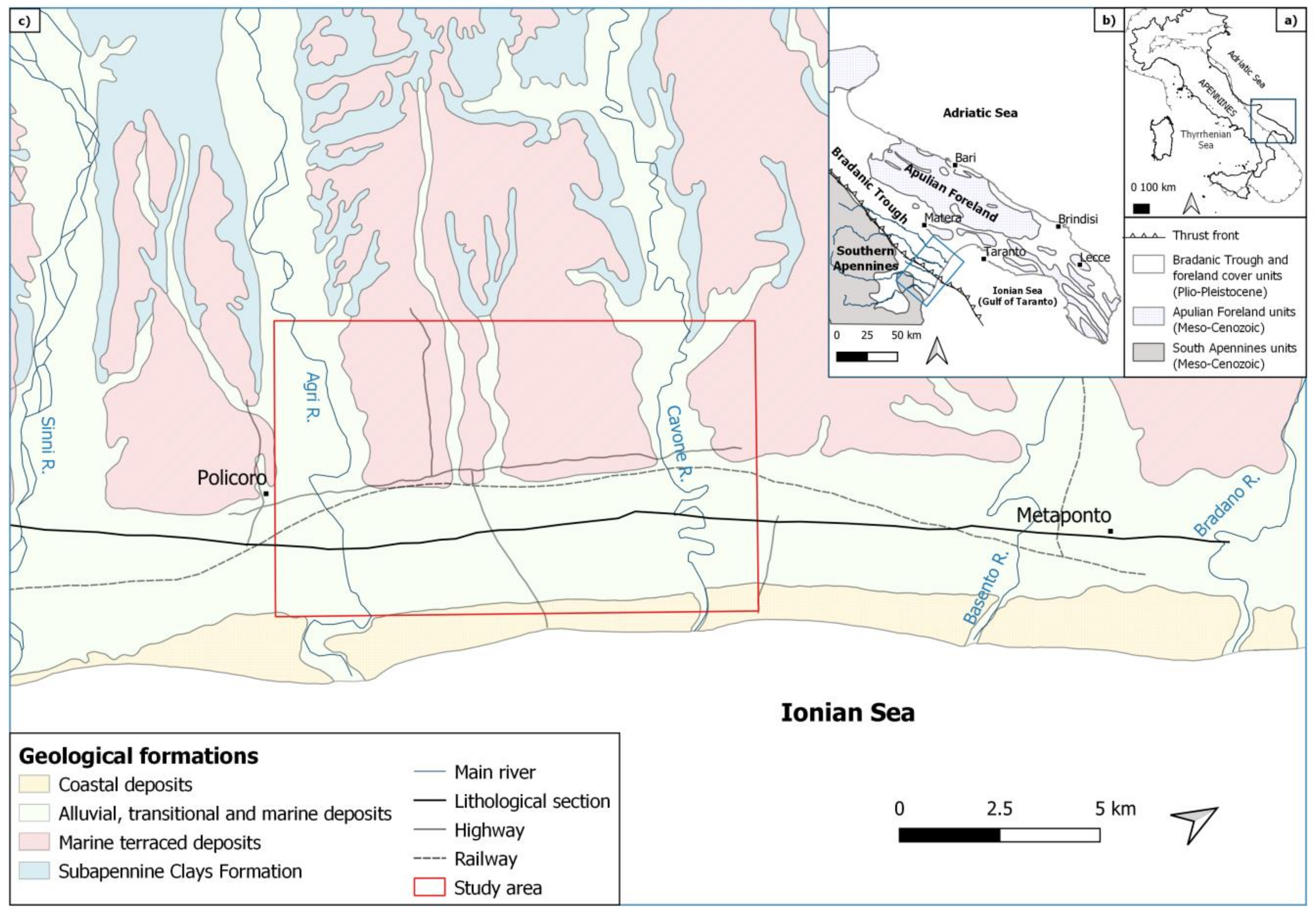
The Metaponto coastal plain extends about 40 km along the Ionian coast, between the Sinni and Bradano Rivers (southern Italy). During the 20th century, the increases in modern irrigation systems, land reclamation works, the overexploitation of wells, and agricultural and industrial activities have deeply modified land use and groundwater availability and quality along the plain. These modifications negatively impacted the natural systems in terms of groundwater and soil salinization, magnifying the risks due to seawater intrusion. In this study, we explored the proneness to seawater intrusion, testing a multidisciplinary approach based on hydrochemical and geophysical investigations. A significant portion of the coastal plain was selected for this purpose. A set of 49 groundwater samples was analyzed to define the chemical characteristics of the water and geoelectrical measurements were recorded along three long profiles. The geoelectrical surveys showed in detail the aquifer bottom pattern where it is deeply incised by paleovalleys, defining the main hydrostratigraphic features, as it is necessary to prevent seawater intrusion worsening. The hydrochemical data highlighted areas with higher seawater intrusion proneness. The acquired measurements show the high proneness to seawater intrusion, especially where the aquifer bottom is very deep below the sea level, also far from the coast, and the relevance of the detailed knowledge of the aquifer bottom in supporting any kind of management. View Full-Text
L’articolo è disponibile open access al seguente link:
Water 2021, 13(1), 53; https://doi.org/10.3390/w13010053
